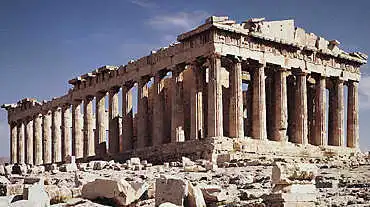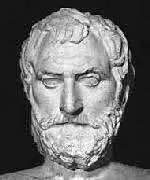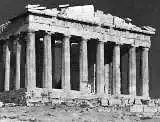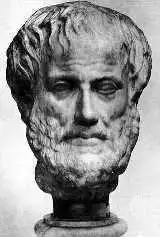Cosmos of the Ancients The Greek Philosophers on Myth and CosmologyThales he earliest cosmological theories of Ancient Greece would be those of Thales of Miletus, honored by his later peers as the very first philosopher and one of the Seven Sages, flourished circa 585 BC. In stating that the world had been formed out of the one substance water, he renounced the mythological accounts of how it all began, replacing divine action with natural processes where no gods were responsible for what took place — although Aristotle claims that the same Thales saw the gods being present in everything, filling it somewhat like an ether or inner substance.
he earliest cosmological theories of Ancient Greece would be those of Thales of Miletus, honored by his later peers as the very first philosopher and one of the Seven Sages, flourished circa 585 BC. In stating that the world had been formed out of the one substance water, he renounced the mythological accounts of how it all began, replacing divine action with natural processes where no gods were responsible for what took place — although Aristotle claims that the same Thales saw the gods being present in everything, filling it somewhat like an ether or inner substance.
 Again according to Aristotle, he regarded also the lifeless things as having a soul, using the magnet's influence on iron as an argument for his case, which Aristotle interpreted as explanatory to Thales' idea that god is in all. Furthermore, Thales may have been the first to maintain the soul's immortality.
Again according to Aristotle, he regarded also the lifeless things as having a soul, using the magnet's influence on iron as an argument for his case, which Aristotle interpreted as explanatory to Thales' idea that god is in all. Furthermore, Thales may have been the first to maintain the soul's immortality.According to Diogenes Laertius he had stated that: "Of all things that are, the most ancient is God, for he is uncreated, " and "The most beautiful is the universe, for it is God's workmanship." If Diogenes is to be trusted in this, Thales expressed a monotheistic opinion, enforced by the impression of Aristotle that the divine, present in all, seems not to have been divided into different divinities — if even distinctly differed from the soul. He claimed, again according to Diogenes Laertius, that there is not even any difference between life and death. None of his own writing remains.
LiteratureAristotle, de Anima, 405a and 411a.Diogenes Laertius, Lives of Eminent Philosophers, translated by R. D. Hicks, volume I, Loeb, London 1942.
© Stefan Stenudd 2000

The Greek Philosophers
AristotleIntroductionAristotle's LifeTimelineAristotle's PoeticsAristotle's CosmologyAbout CookiesMy Other WebsitesCREATION MYTHSMyths in general and myths of creation in particular.
TAOISMThe wisdom of Taoism and the Tao Te Ching, its ancient source.
LIFE ENERGYAn encyclopedia of life energy concepts around the world.
QI ENERGY EXERCISESQi (also spelled chi or ki) explained, with exercises to increase it.
I CHINGThe ancient Chinese system of divination and free online reading.
TAROTTarot card meanings in divination and a free online spread.
ASTROLOGYThe complete horoscope chart and how to read it.
MY AMAZON PAGE
MY YOUTUBE AIKIDO
MY YOUTUBE ART
MY FACEBOOK
MY INSTAGRAM
MY TWITTER
STENUDD PÅ SVENSKA
|
 Cosmos of the Ancients
Cosmos of the Ancients